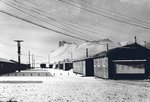

The Lewis County Historical Museum is hosting a Remembrance Day event for the 80th anniversary of the Japanese-American internment at 2 p.m. on Saturday at the museum, 599 NW Front St., Chehalis.
The event seeks to make a tribute to local residents of Japanese descent who were forced to board a U.S. Army train at the Chehalis Train Depot 80 years ago for an internment that lasted throughout World War II.
Eighty-six Lewis County residents departed from the depot on June 2, 1942, bound for Tule Lake, California.
“Greater Lewis County area residents were among the first of more than 100,000 people of Japanese ancestry, exiled from the West Coast,” according to the event’s Facebook page.
The exile came as a result of Executive Order 9066 issued by President Franklin Roosevelt on Feb. 19, 1942, museum Executive Director Jason Mattson told The Chronicle. That executive order was followed by Civilian Exclusion Order No. 1 on March 24, 1942.
“Allowed only to take what they could carry — and not knowing where they were going, the length of time they would be gone or if they would ever return — families from Adna, Bay Center, Centralia, Chehalis, Long Beach, Nahcotta, Onalaska, Raymond, South Bend and Raymond boarded the train on June 2, 1942, for their final destination at a War Relocation Authority incarceration camp in Tule Lake, California,” the post for the event states.
Mattson said the internment happened “because of fear and racism and a lot of unknowing from, basically, the white people in the country.”
According to Mattson, the internment sent “anyone of Japanese descent to these, basically, concentration camps.”
The interned Americans were placed in poor conditions in barracks with canvas walls they had to share with other families with no privacy, Mattson said. With rudimentary latrines and food void of any real nutritional value, the kids were placed in school-like institutions and given the basics of recreation time, but armed guards were barring the Japanese-Americans from exiting the facility, which was enclosed by barbed-wire fences.
“I think at Tule Lake, there were some uprisings that happened that didn’t happen at other places because the conditions were just so bad. They were getting tired of it,” Mattson said.
The Remembrance Day program will highlight the families who were affected, their accomplishments and their impact on Lewis County’s community. During the program, the names of all persons bound from the Chehalis Train Depot to Tule Lake will be read aloud.
There will also be an exhibit featuring an interactive kiosk from the Japanese American Museum of Oregon as well as a documentary.
Admission to the event is free. However, donations will be accepted during regular museum hours on Saturday from 10 a.m. to 4 p.m.
With doors opening at 2 p.m. for the exhibit, the Remembrance Day program itself will begin at 2:30 p.m.
Mattson said he organized the event “so we don’t forget and hopefully don’t repeat it.”
“There was so much propaganda and fear-mongering,” Mattson said. “It’s something that should never happen again.”
He said honoring the interned people, many of whom had never stepped foot in Japan, is of the utmost importance.
“So much of history just gets forgotten, or white-washed,” he said. “It’s important to keep people aware of it, and make sure they know the details of what happened.”
If we don’t remember, he said, history may repeat itself, and maybe already is repeating itself to some degree, Mattson said.
“It’s sort of still happening,” he said. “Like (with) a lot of the immigrants coming in from Mexico. The conditions probably aren’t as bad, but there’s still (the government) putting people in cages, basically.”
For more information, contact The Lewis County Historical Museum at 360-748-0831, or email director@lewiscountymuseum.org.
For more information on the Tule Lake internment camp, visit https://www.nps.gov/tule/index.htm, https://www.tulelake.org/history or https://encyclopedia.densho.org/Tule_Lake/.